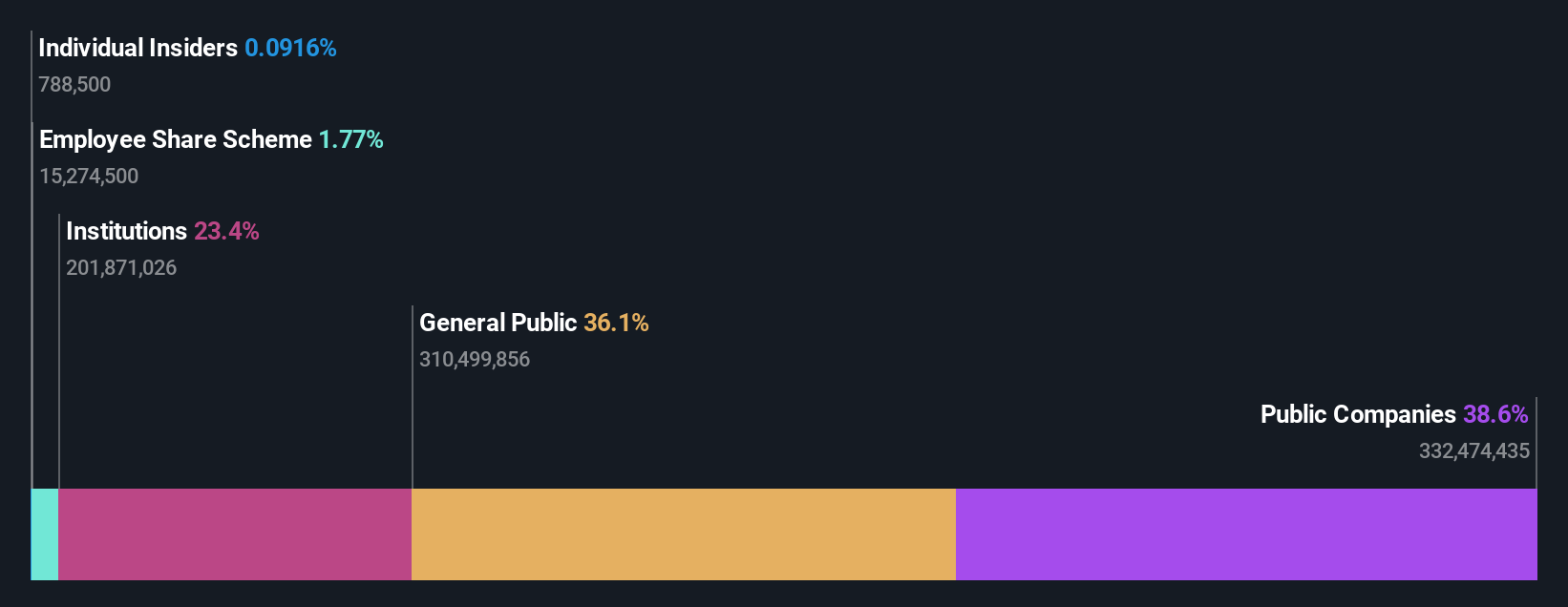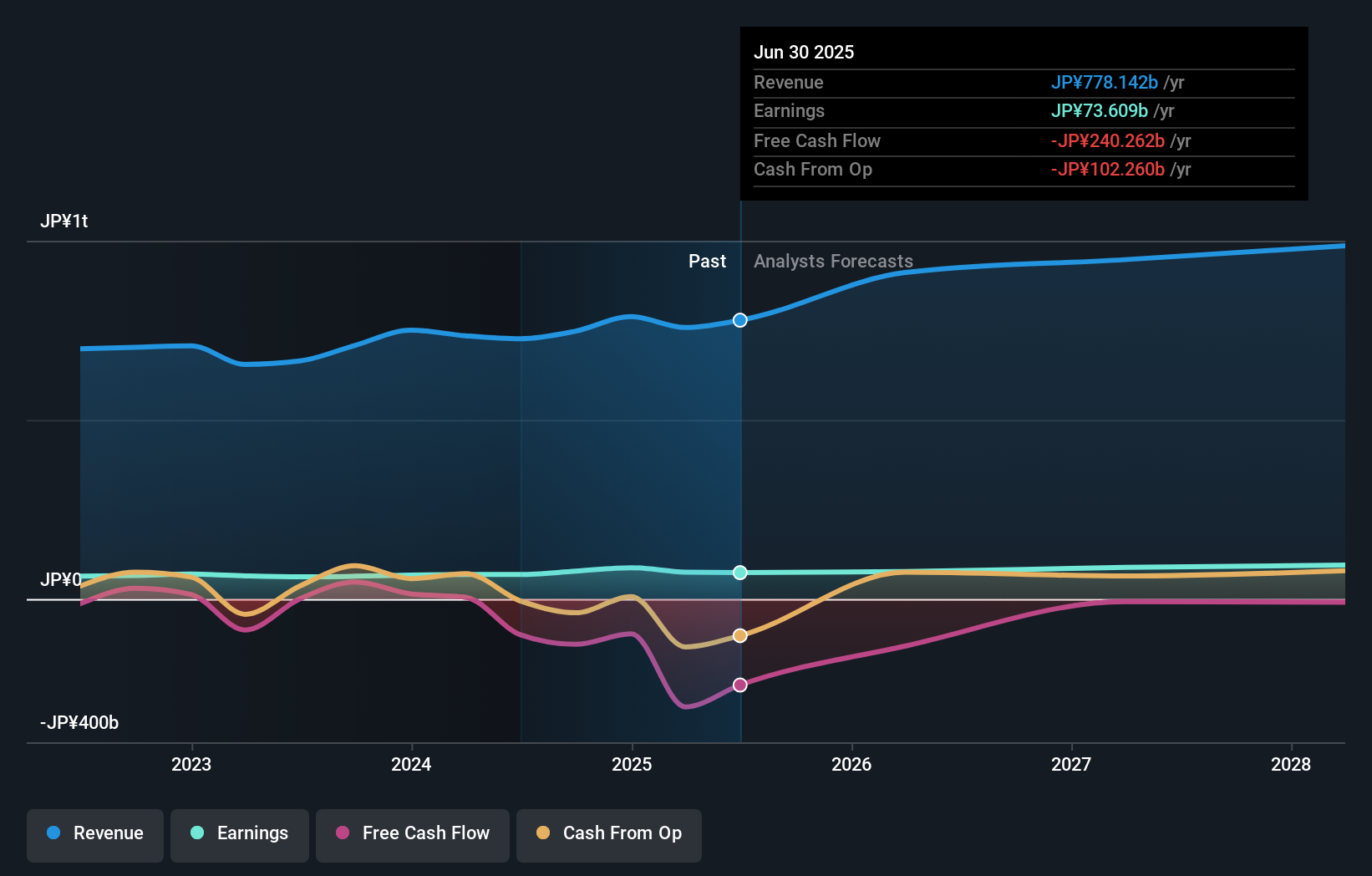- Japan
- /
- Real Estate
- /
- TSE:3231
Nomura Real Estate Holdings, Inc.'s (TSE:3231) largest shareholders are public companies who were rewarded as market cap surged JP¥29b last week
Key Insights
- Significant control over Nomura Real Estate Holdings by public companies implies that the general public has more power to influence management and governance-related decisions
- The top 5 shareholders own 51% of the company
- Institutions own 23% of Nomura Real Estate Holdings
To get a sense of who is truly in control of Nomura Real Estate Holdings, Inc. (TSE:3231), it is important to understand the ownership structure of the business. The group holding the most number of shares in the company, around 39% to be precise, is public companies. In other words, the group stands to gain the most (or lose the most) from their investment into the company.
As a result, public companies were the biggest beneficiaries of last week’s 3.6% gain.
Let's take a closer look to see what the different types of shareholders can tell us about Nomura Real Estate Holdings.
See our latest analysis for Nomura Real Estate Holdings

What Does The Institutional Ownership Tell Us About Nomura Real Estate Holdings?
Institutional investors commonly compare their own returns to the returns of a commonly followed index. So they generally do consider buying larger companies that are included in the relevant benchmark index.
As you can see, institutional investors have a fair amount of stake in Nomura Real Estate Holdings. This implies the analysts working for those institutions have looked at the stock and they like it. But just like anyone else, they could be wrong. If multiple institutions change their view on a stock at the same time, you could see the share price drop fast. It's therefore worth looking at Nomura Real Estate Holdings' earnings history below. Of course, the future is what really matters.

Nomura Real Estate Holdings is not owned by hedge funds. The company's largest shareholder is Nomura Holdings, Inc., with ownership of 39%. Meanwhile, the second and third largest shareholders, hold 4.7% and 2.8%, of the shares outstanding, respectively.
To make our study more interesting, we found that the top 5 shareholders control more than half of the company which implies that this group has considerable sway over the company's decision-making.
While it makes sense to study institutional ownership data for a company, it also makes sense to study analyst sentiments to know which way the wind is blowing. There are plenty of analysts covering the stock, so it might be worth seeing what they are forecasting, too.
Insider Ownership Of Nomura Real Estate Holdings
The definition of company insiders can be subjective and does vary between jurisdictions. Our data reflects individual insiders, capturing board members at the very least. Management ultimately answers to the board. However, it is not uncommon for managers to be executive board members, especially if they are a founder or the CEO.
I generally consider insider ownership to be a good thing. However, on some occasions it makes it more difficult for other shareholders to hold the board accountable for decisions.
Our most recent data indicates that insiders own less than 1% of Nomura Real Estate Holdings, Inc.. Keep in mind that it's a big company, and the insiders own JP¥763m worth of shares. The absolute value might be more important than the proportional share. It is always good to see at least some insider ownership, but it might be worth checking if those insiders have been selling.
General Public Ownership
The general public-- including retail investors -- own 36% stake in the company, and hence can't easily be ignored. This size of ownership, while considerable, may not be enough to change company policy if the decision is not in sync with other large shareholders.
Public Company Ownership
It appears to us that public companies own 39% of Nomura Real Estate Holdings. This may be a strategic interest and the two companies may have related business interests. It could be that they have de-merged. This holding is probably worth investigating further.
Next Steps:
I find it very interesting to look at who exactly owns a company. But to truly gain insight, we need to consider other information, too. For instance, we've identified 2 warning signs for Nomura Real Estate Holdings that you should be aware of.
Ultimately the future is most important. You can access this free report on analyst forecasts for the company.
NB: Figures in this article are calculated using data from the last twelve months, which refer to the 12-month period ending on the last date of the month the financial statement is dated. This may not be consistent with full year annual report figures.
Valuation is complex, but we're here to simplify it.
Discover if Nomura Real Estate Holdings might be undervalued or overvalued with our detailed analysis, featuring fair value estimates, potential risks, dividends, insider trades, and its financial condition.
Access Free AnalysisHave feedback on this article? Concerned about the content? Get in touch with us directly. Alternatively, email editorial-team (at) simplywallst.com.
This article by Simply Wall St is general in nature. We provide commentary based on historical data and analyst forecasts only using an unbiased methodology and our articles are not intended to be financial advice. It does not constitute a recommendation to buy or sell any stock, and does not take account of your objectives, or your financial situation. We aim to bring you long-term focused analysis driven by fundamental data. Note that our analysis may not factor in the latest price-sensitive company announcements or qualitative material. Simply Wall St has no position in any stocks mentioned.
About TSE:3231
Nomura Real Estate Holdings
Operates as a real estate company in Japan and internationally.
Average dividend payer with acceptable track record.
Similar Companies
Market Insights
Community Narratives





